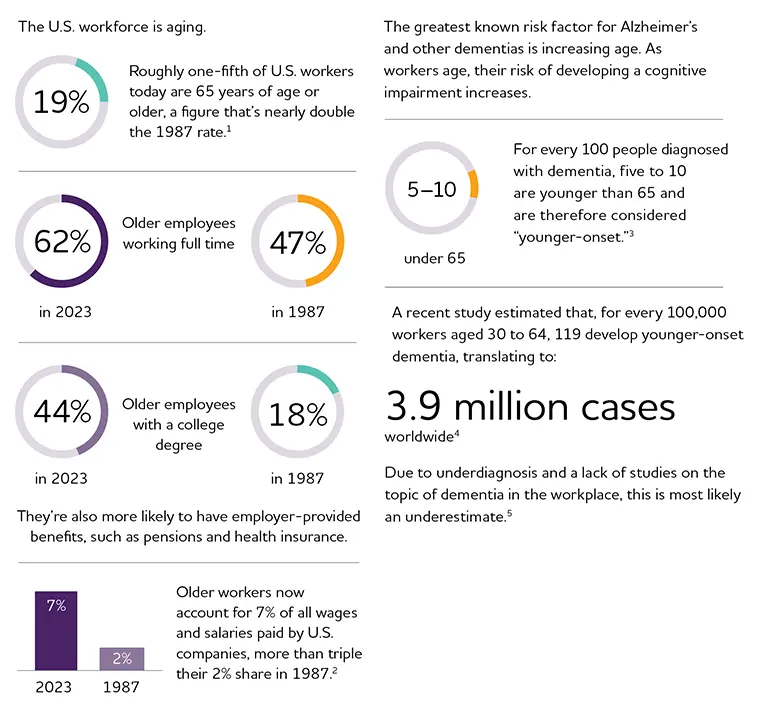
Your Gift Can Make 2x the Impact
Your Gift Can Make 2x the Impact
A gift can go twice as far during our February $100,000 2x Match. Your contribution by Feb. 27 will fuel Alzheimer’s research and help provide essential care and support.
Donate NowCompassionate Approaches for a Hidden but Growing Concern
 Due to the aging of the U.S. population, rates of cognitive impairment and dementia in the workplace are on the rise. This creates challenges for employers, many of whom may not know how to best support employees who are experiencing symptoms of cognitive impairment. Conversely, employees may be hesitant to share with their employer the challenges that they’re experiencing.
Due to the aging of the U.S. population, rates of cognitive impairment and dementia in the workplace are on the rise. This creates challenges for employers, many of whom may not know how to best support employees who are experiencing symptoms of cognitive impairment. Conversely, employees may be hesitant to share with their employer the challenges that they’re experiencing.
Symptoms begin gradually and are often acknowledged first at work. Diagnosis may be difficult in younger people, since the majority of individuals diagnosed with cognitive impairment are 65 or older. Nevertheless, most persons living with dementia never tell their employer of their cognitive concerns due to stigma or fear of losing their job, and most employers have no policies or education on dementia.
Declining performance can wrongly be blamed on depression, substance use, stress or other issues, and many workers are demoted or fired. A supportive company culture increases the chances that a worker will disclose cognitive concerns, allowing critical conversations to occur. Providing accommodations for employees who wish to keep working and are able to, based on job responsibilities and safety, can retain historical knowledge, preserve workplace teams, and create a positive work culture where employees feel safe acknowledging health problems. Workplace awareness, compassion and policies regarding dementia as a disability can therefore protect and support employees and businesses alike. Overall, companies need to create and foster a dementia-friendly workplace.
Recommendations Regarding Dementia in the Workplace
-
Provide training to human resources personnel and supervisors on the warning signs of Alzheimer’s and dementia and on basic disability law through the Americans with Disabilities Act.
-
Encourage employees to seek medical advice for early diagnosis and treatment, maintain healthy habits, and manage their health.
-
Educate any outsourced work resources (for example, third-party human resources teams) on the best way to support workers with disabilities to ensure they share your supportive company culture.
-
Help employees fully understand disability benefits and retirement and work options.
-
Consider accommodations that can be unique to workers and jobsites, including options such as:
-
Simplifying or modifying employees’ roles, responsibilities, settings or routines.
-
Flexible hours.
-
Technology-based reminders.
-
“Buddy” employees.
-
Additional supervision.
-
-
Include employees’ trusted family members or friends, physician, and other members of the care team in discussions when feasible and desirable.
-
Evaluate the status of any accommodations (from both workers’ and the employer’s perspective), adjustments that may be needed, and employees’ interest in remaining at work versus retiring.
-
Provide training for employees—particularly client-facing employees—on recognizing the warning signs of cognitive decline in the event they experience it in those with whom they interact.
-
Help to positively transition those living with dementia out of the workplace at the appropriate time by providing support and allowing for a dignified exit.
Future Directions
Corporate America can play an important role in promoting dementia-friendly workplaces and communities. Employers can foster trusted relationships with employees and their families through workplace events that build comradery and combat social isolation. Additionally, employers may consider flexibility in work-from home options, which can ease family burden.
Additional system-level changes are needed as well. Legislation is necessary to protect the benefits of persons who are fired for performance reasons but later found to have had dementia. An easier process for employees and family caregivers to execute and utilize power of attorney documents should also be created and may lessen family burden. Addressing these and other issues will help ensure that persons living with dementia can devote their remaining years to the activities that give their life meaning and joy, including work, while at the same time providing tangible and intangible benefits to employers and coworkers.

In any context, dementia and mild cognitive impairment (MCI) can be a frightening and uncomfortable topic, and most people associate it with individuals of advanced age. In the workplace, dementia is often discussed only when employees need additional support and flexibility to provide care for a family member (for example, a parent or grandparent) living with a disease that causes dementia, such as Alzheimer’s disease. However, dementia and MCI occur among workers as well, especially as their average age rises. Workplaces can no longer ignore this “hidden” issue, which can impact job performance, threaten the cohesiveness and effectiveness of work teams, and have potentially serious financial and legal implications for both the company and employees.
Endnotes
- Richard Fry and Dana Braga, “Older Workers Are Growing in Number and Earning Higher Wages,” Pew Research Center, December 14, 2023.
- See note 1, above.
- Xi-Chen Zhu, Lan Tan, Hui-Fu Wang and Teng Jiang, “Rate of early onset Alzheimer’s disease: A systematic review and meta-analysis,” Annals of Translational Medicine, 3(3): 38, March 2015.
- Stevie Hendriks, MSc, Kirsten Peetoom, Ph.D, Christian Bakker, Ph.D, et al., “Global Prevalence of Young-Onset Dementia,”JAMA Neurology, 78(9): 1-11, July 19, 2021.
- Louise Ritchie, Debbie Tolson and Mike Danson, “Dementia in the workplace case study research: Understanding the experiences of individuals, colleagues and managers,” Ageing and Society, 38(10): 1-30, June 2017.
